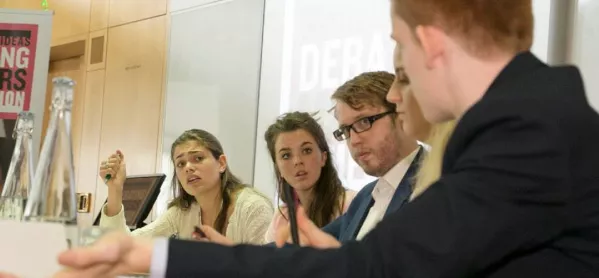Some five years ago, almost to the day, I was lucky enough to compete in and win the Institute of Ideas Debating Matters Competition with my school, Hutton Church of England Grammar School from Lancashire. After the immediate euphoria had subsided, I was left with a significant impression that I had gone through an educative experience like no other. Without being overtly preachy, the competition had shown me that contemporary debates are never as simple as they initially seem and in order to make a contribution, I had to be ready for a tough fight.
I went on to volunteer for the competition’s alumni program while at university and roughly a year ago was offered the opportunity to work for the competition, which I, of course, accepted; this competition is still noticeably relevant to young people. Speaking to competing students throughout last weekend’s national finals only confirms my view.
The competition panders to no one. And what may be surprising is that young people appreciate it. While we work under a commitment to take young people seriously and give them an opportunity to contribute to serious adult discussion, Debating Matters does not take a person seriously just because of their age. In our format, students face periods of intense questioning from both eminent adult judges and their peers in the audience. If you do not do your research, there is nowhere to hide.
David Tipping, a student from Hutton Grammar School (who were back in the national final for the first time since my appearance), told me that he found the format “refreshing because it is challenging”, while his debate partner Stuart Mercer remarked: “How can you be inspired if you don’t have to work for it?”
Ultimately, teenagers appreciate that the discussions are meant to be difficult because they reflect real world debates. Unlike countless engagement projects, Debating Matters does not appeal to young people because it is in some way novel to do so, but because we know young people have the ability to make informed, thoughtful contributions about some of the most contentious issues of the day.
Yet, Debating Matters gives students every opportunity to succeed if they are good enough. The competition was founded on the principal that content was more important than style; that what you said was more important than how you said it. Sam Cooke, student at Withington Girls’ School in Manchester and best individual at this year’s national final, remarked that the lasting impression the competition would have on her was “the grace of accepting that it is better to lose on weak arguments than win through disingenuity.” The competition provides no loop holes or cheap ways to win; to be successful you actually have to earn it.
With mainstream media flirting ever-closer with simple Russell Brand-style conclusions and a university culture ever-willing to shout down debate through dogmatic groupthink, young people appreciate the opportunity to engage in educated discussion. Ben Maloney, a student from Beckfoot School, which became Debating Matters champions at the weekend, said that the key point he would take away from Debating Matters was that “no matter how difficult the issue, or how seemingly obvious the answer, there are always arguments on both sides”.
While it is in the very nature of a debating competition for students to argue a set position, what is clear is that young people appreciate the encouragement to do some research and think for themselves.
And I think it is for these reasons that a debating competition I took part in when at school aged 18 is still relevant to me today. Ultimately, Debating Matters does not offer anything uniquely appealing to teenagers. Rather, the competition seeks to show that if you work hard, engage intellectually with the issues and have something to say, people of all ages will listen.
Pictured, left to right: Lucy Elliot, Olivia Wells (Norwich High School for Girls), David Bowden (of the Institute of Ideas), Sarah Taylor and Thomas Goulding (The Hermitage Academy). Picture credit: Chris Sharp
